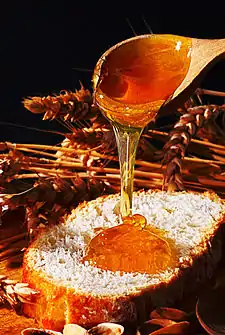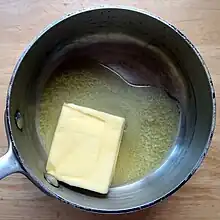< Reconstruction:Proto-Turkic
Reconstruction:Proto-Turkic/almïla
Proto-Turkic
Alternative reconstructions
- *alïmla, *ālimla
Etymology
From *āl (“red”) + *mïla (“apple?”). Literally meaning (red apple), possibly cognating with Ancient Greek μῆλον (mêlon, “apple”), from an unknown source. It is highly probable that the name of the fruit, which spread to the world from Central Asia in the Bronze Age, was taken from a common source in various languages.
Declension
Declension of *almïla (Common Turkic)
| singular | plural2) | |
|---|---|---|
| nominative | *almïla | *almïlalar |
| accusative | ||
| genitive | *almïlanïŋ | *almïlalarnïŋ |
| dative | *almïlaka | *almïlalarka |
| locative | *almïlada | *almïlalarda |
| ablative | *almïladan | *almïlalardan |
| instrumental1) | *almïlalarïn | |
| equative1) | *almïlača | *almïlalarča |
1)The original instrumental and equative cases have fallen into disuse in many Common Turkic languages.
2)This plural suffix is used only on Common Turkic, and not in Oghur. See also the notes on the Proto-Turkic/Locative-ablative case and plurality page on Wikibooks.
2)This plural suffix is used only on Common Turkic, and not in Oghur. See also the notes on the Proto-Turkic/Locative-ablative case and plurality page on Wikibooks.
Descendants
- Oghur:
- Chuvash: омла (omla) (dialectal) [note 1]
- Common Turkic: *alma (see there for further descendants)
Reconstruction notes
- This form is either a contraction of *alïmla or a metathesis of улма (ulma); the latter form, in turn, is perhaps a later borrowing form Kipchak. If the Chuvash dialectal forms with -ml- are more archaic, *alïmla could be reconstructed for Proto-Turkic as well.
- According to Doerfer, the entry in Dīwān should be read as alïmla. It follows from this proposition that the Common Turkic reconstruction should too have the shape of *alïmla rather than *almïla as proposed here. The reconstruction along the lines of Doerfer's *alïmla is also potentially easier to reconcile with the shape of the Mongolic derivative *alima.
See also
| Foods - *yẹ̄miĺčler, *yẹ̄miĺčsāyïn | |||||
|---|---|---|---|---|---|
 Barley |
barley: *arpa |
Pea |
beans, peas: *burčak |
 Wheat |
farro, wheat: *bugday |
|
Jujube |
jujube: *yidge |
 Strawberry |
strawberry: *yidgelek |
Apple |
apple: *almïla |
Hazelnuts |
hazelnut: *bōńurï |
Walnuts |
walnut: *yaŋgak |
 Honey |
honey: *bạl |
|
Millet |
millet: *tạrïg |
 Onion |
onion: *sōgun |
Salt |
salt: *tūŕ |
 Egg |
egg: *yumurtka |
 Butter |
butter: *yāg |
 Mushroom |
mushroom: *kömbe |
|
Radish |
radish: *turp, *turma |
Carrot |
carrot: *turma | ||
References
- al-Kashgarî, Mahmud (1072–1074) Besim Atalay, transl., Divanü Lûgat-it-Türk Tercümesi [Translation of the “Compendium of the languages of the Turks”] (Türk Dil Kurumu Yayınları; 521) (in Turkish), 1985 edition, Ankara: Türk Tarih Kurmu Basımevi, published 1939–1943, page 315
This article is issued from Wiktionary. The text is licensed under Creative Commons - Attribution - Sharealike. Additional terms may apply for the media files.